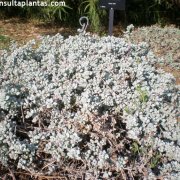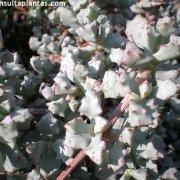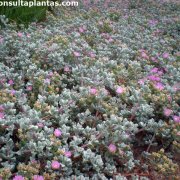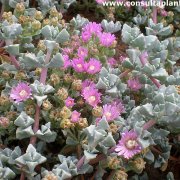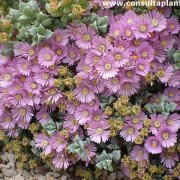Care of the succulent plant Oscularia deltoides or Pink Ice Plant |
|
The genus Oscularia, family Aizoaceae, comprises 20 species of succulent plants native to southern Africa. Some species are: Oscularia deltoides, Oscularia pedunculata, Oscularia falciformis, Oscularia pedunculata, Oscularia steenbergensis. Common names: Pink Ice Plant, Tooth-leaf Rock Vygie, Pink Iceplant, Deltoid-leaved dewplant. Scientific synonyms: Lampranthus deltoides, Mesembryanthemum deltoides. This species is native to South-western Cape, South Africa. They are succulent plants with reddish stems that form thick clumps of creeping bearing 30 cm (11.8") high. The attractive bluish foliage is composed of characteristic fleshy leaves with slightly serrated edges with false spines. The interesting pink flowers with a yellow center appear so abundantly that they cover the leaves. They bloom in spring and summer. Pink Ice Plant is used in rockeries, on borders, as a covering for dry areas of the garden and small walls, in hanging pots or as indoor and greenhouse plants. Oscularia deltoides grows in light shade exposure but prefers full sun to produce more flowers. It resists occasional frosts down to -5 ºC (23 ºF). Tooth-leaf Rock Vygie can grow in any type of soil that has good drainage. Water moderately in spring and summer, waiting for the substrate to dry well. In winter do not water. Pink Iceplant resists drought very well. Fertilize once a month in spring and summer with succulent plant fertilizer to promote flowering. Prune lightly after flowering to keep it compact and to control growth. Oscularia deltoides is resistant to pests but is very sensitive to overwatering. Deltoid-leaved dewplant is propagated from seed sown in spring or, more easily, by cuttings that quickly form roots. |
Images of the succulent plant Oscularia deltoides or Pink Ice Plant |
Find plants
Oscularia deltoides or Pink Ice Plant | Care and Growing
© 2026 FavThemes
